

This was a major conference with more than just the usual suspects in attendance, and everyone had a big announcement.
Back home from LinuxWorld, the first Linux conference held on the West Coast, I am finding it difficult to concentrate and get back in the normal groove. I spent a remarkable two days, March 2 and 3, in the San Jose Convention Center and everyone who didn't go has been dropping by to find out about it. This was a major conference with more than just the usual suspects in attendance, and everyone had a big announcement.
Over 6,000 people turned out to join in the excitement. Described by one attendee as “heady stuff”, I can't think of a better way to describe it. The attendance by the big-name vendors is a sure sign that Linux has made the big leagues. When introducing Dr. Michael Cowpland's keynote speech, Jon “maddog” Hall described this conference as Linux's “coming out” or “sweet 16” party, with the business community embracing the Linux community and Linux embracing business—“Welcome to the world of Linux!” he said.
Dr. Cowpland gave an articulate speech, focusing on the ways Corel is using Linux now and in the future. While I was a bit surprised to learn the first keynote was a company presentation, it certainly gave a clear picture of how big business perceives Linux as an excellent opportunity for promoting growth and profit. Dr. Cowpland said again that Corel would be porting all their products to Linux and continuing to support the WINE project. His presentation of the Quattro Pro spreadsheet program running on WINE was quite impressive—fast and quite attractive. He announced WordPerfect Office 2000, stressing their goal of “value, performance and compatibility”, and a Corel distribution which will combine the best features from each of the current distributions and be ready for release in the fall. He predicted that by the end of the year, we will be able to buy high-performance computers, such as Gateway, for $600 to $800, preloaded with Linux. Sounds good to me.
Linus gave a well-received keynote address and participated on a panel discussion of “The Continuing Revolution”, moderated by Eric Raymond. He also showed up at the Compaq booth with Jon Hall for fans to visit, take photos and get autographs.
I attended only one other talk (too much booth duty) and that one was by Larry Wall (See in this issue). Larry has a casual speaking style that fits well into this environment. Two quotes I enjoyed were:
Perl does one thing right—it integrates all its features into one language.
Journalists who give Perl bad press should experience more angst in their writing.
Speaker Dan Quinlan will also be appearing in our pages soon. Dan is writing a feature article for our June Standards issue.
I spent a good bit of time talking to various vendors. Here's a bit of what I found out:
Tripwire Security Systems, Inc.: Tripwire is a file integrity security system (see “Tripping up Intruders with Tripwire” by Kevin Fenzi, August 1997) that became commercial in January of this year. All 2.x releases are still freely available and include the basic support of 48-hour e-mail response. They provide extended support (4-hour response) for a fee. Biggest additions are Algomol encryption for the database, damage inventories and e-mail warnings when damaged files are found. I brought back a Tripwire CD for our system administrator to play with, so expect a review in a future issue.
GraphOn: This company is promoting their Go-Global thin PC X server software designed for high-speed access to UNIX/X-based applications on the server from any desktop. A web site has been established at http://playpen.graphon.com/, where Windows users can enjoy the experience of running Linux. Corel, a partner of GraphOn, has embedded the thin-client software in WordPerfect 8, making it web-enabled.
ICP Vortex: This German-based company has the number one RAID controller in Europe and they have a fully bootable implementation for Linux. Drivers for their controller can be found in all major distributions. Beginning this month, they are shipping a 64-bit PCI-fibre channel RAID controller, which can also be run in 32-bit slots. ICP is committed to continuing support of the Linux operating system. One of their big users in the U.S. is Linux Hardware Solutions, and they have promised us a review of this excellent RAID device.
Precision Insight: With funding from Red Hat and XGI, this company is creating an OpenGL 3-D infrastructure within XFree86 servers that will enable developers to access device drivers which permit access to OpenGL clients.
Cygnus Solutions: Cygnus Solutions has had an open source business model since 1989, providing support for open source software. It is now a member of the Fortune 500. At this show, they talked to me about the cross-compilers included in their GNUPro Toolkit for Linux. The Toolkit includes all the popular GNU tools, along with added features and custom enhancements such as a graphical user interface to the tools.
IBM demonstrated several of their products that now run on Linux, including the WebSphere product line, the Andrew File System and the DB2 database system. Also on display was the first commercial, Java-based emulator for Linux called IBM Host On-Demand. This product provides secure access to data and applications via a web browser. When I asked how it happened that IBM was entering the Linux market, the answer was “user demand”. How about that—asking for what you want truly works!
Informix: Janet Smith of Informix graciously came by the Linux Journal booth to visit me while I was on booth duty. Informix has a very large presence among value added resellers (VARs) and recently formed an alliance with Hewlett-Packard to deliver Linux-based Internet solutions through their Covision program. Informix also announced an alliance with Jones Business Systems, by which Informix Linux products will be distributed through JBS' reseller channels. HP was also at the conference to show off OpenMail, but I didn't get the chance to talk to them.
Stalker Software: Ali Liptrot of Stalker Software also came by to say “hi”. When I went by their booth, it was flooded with traffic to see the demonstrations of their CommuniGate Pro messaging system.
Appgen Business Software, Inc.: Jim Kelly stopped by to tell me about their financial software. I had thought financial software was one place Linux was weak—looks like I was wrong.
All the major distributions were there giving away t-shirts and other goodies, and in general amazing everyone with their new releases. I saw a beta demonstration of Caldera's next release of OpenLinux which has the easiest install I've ever seen. They've provided a GUI using QT from Troll Tech, and it just zips through, probing for mouse and other information, completing the install without the user having to do a thing. It even provides a window so you can play Tetris while waiting for the install to complete. Not having a “smart” install is one item many people have said was a major drawback for Linux—well, now Linux has it. One more reason for not using Linux has just been blown away.
While doing booth duty on Wednesday, I got to meet many of our readers and authors as well as introduce new people to Linux Journal. I had a lot of fun. We shared our booth space with our publisher SSC, there to promote their latest book, The Artists' Guide to the GIMP by Michael J. Hammel. Michael was there and many fans showed up to meet him and have their books signed.
All in all, it was a great show and IDG is planning a repeat performance in August. So if you missed it, come and drop by the LJ booth then for a visit. Heady stuff, indeed!
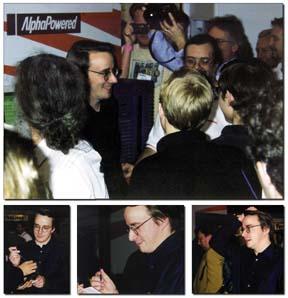
Competition for photographs of and autographs from Linus was fierce
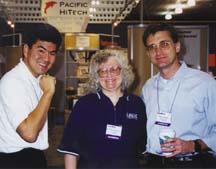
Marjorie with Craig Oda and Lonn Johnston from Pacific HITech
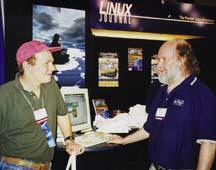
Donald Becker of 3M and Phil Hughes
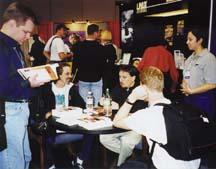
Michael J. Hammel signs GIMP books
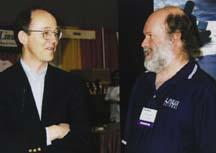
Bob Young of Red Hat chats with Phil
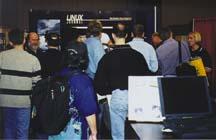
The LJ booth was slammed